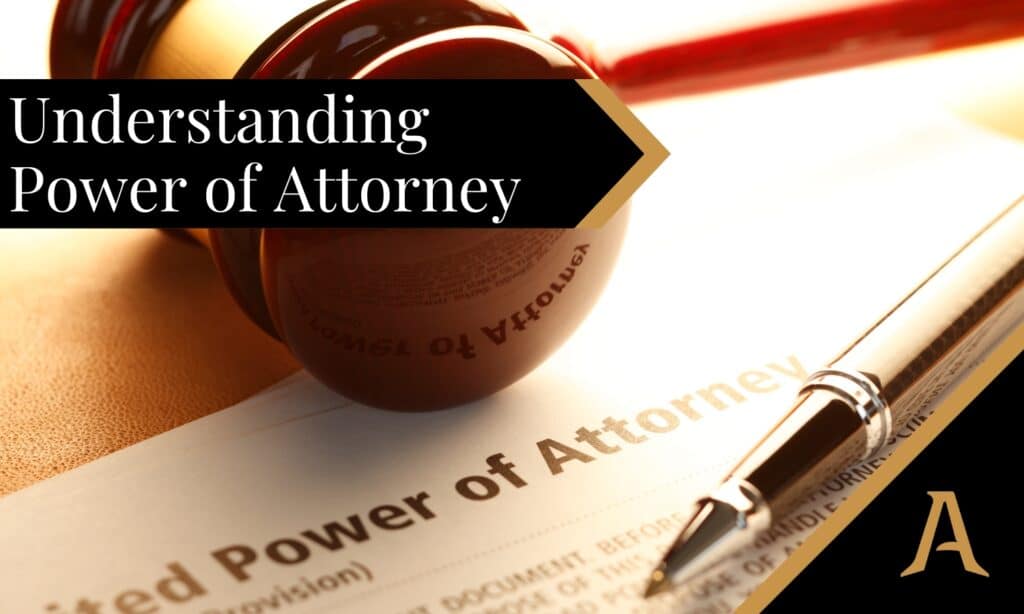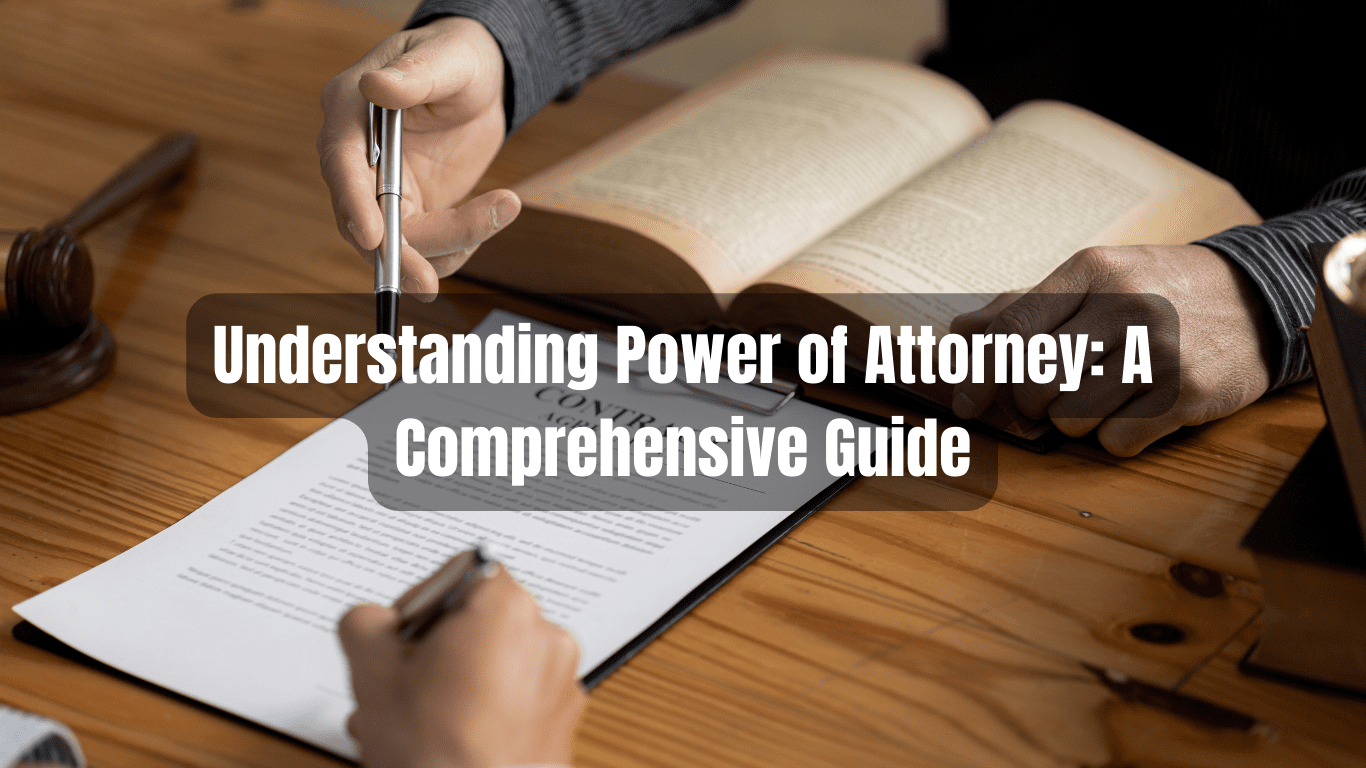
Understanding the Power of Attorney: Your Essential Guide to Peace of Mind
Life is full of uncertainties. While we can’t predict the future, we can prepare for it. One of the most crucial steps in safeguarding your well-being and your assets is understanding and establishing a Power of Attorney (POA). Often misunderstood or overlooked, a POA is a powerful legal document that grants someone you trust the authority to make decisions on your behalf if you become unable to do so yourself.
For many, the thought of legal documents can be intimidating. But don’t worry – this comprehensive guide will break down the complexities of Power of Attorney into easy-to-understand language, helping you gain clarity and peace of mind.
What Exactly is a Power of Attorney (POA)?
At its core, a Power of Attorney (POA) is a legal document that allows one person (the "Principal") to give another person (the "Agent" or "Attorney-in-Fact") the authority to act on their behalf in specific matters. Think of it like giving someone the keys to your car and the permission to drive it – but for your finances, property, or healthcare decisions.
This authority can be broad or limited, immediate or effective only under certain conditions. The key is that the Agent acts as your representative, stepping into your shoes to manage your affairs when you cannot.
Why Do You Need a Power of Attorney? It’s Not Just for the Elderly!
Many people mistakenly believe that Powers of Attorney are only for the very old or those facing imminent health crises. This couldn’t be further from the truth. While they are indeed vital for elder care planning, anyone over the age of 18 can benefit from having one. Here’s why a POA is an essential part of your personal and financial planning:
- Incapacity Due to Illness or Accident: This is the most common reason. If you suddenly become incapacitated due to an accident, stroke, severe illness, or cognitive decline, who will pay your bills, manage your investments, or make critical medical decisions if you can’t communicate your wishes? Without a POA, your loved ones might have to go through a lengthy and expensive court process (guardianship or conservatorship) to gain this authority.
- Convenience and Travel: You might need someone to sign documents, manage a property sale, or handle financial transactions while you’re out of the country or simply unavailable. A limited POA can grant this temporary authority.
- Avoiding Court Intervention: Without a valid POA, if you become incapacitated, a court might have to appoint a guardian or conservator to manage your affairs. This process can be slow, costly, public, and the court-appointed person might not be who you would have chosen.
- Ensuring Your Wishes are Respected: A POA ensures that the person you trust most is making decisions that align with your values and desires, whether it’s about your medical treatment or how your finances are managed.
- Protecting Your Assets: An agent can continue to pay mortgages, insurance premiums, and other essential bills, preventing late fees, foreclosures, or lapsed coverage.
Decoding the Types of Power of Attorney: Which One is Right for You?
Not all Powers of Attorney are created equal. Understanding the different types is crucial to choosing the right document for your specific needs.
1. General Power of Attorney
- Broad Authority: Grants your Agent extensive authority to act on your behalf in almost any matter, including financial transactions, property dealings, and legal affairs.
- Immediate Effect: Becomes effective immediately upon signing and remains in effect until you revoke it, become incapacitated (unless it’s also durable), or pass away.
- Use Case: Often used for convenience, such as managing affairs while traveling.
2. Durable Power of Attorney (DPOA)
- Continues During Incapacity: This is the most important distinction. A Durable POA remains in effect even if you become mentally or physically incapacitated. If a POA is not durable, it automatically terminates upon your incapacitation.
- Crucial for Long-Term Planning: Essential for ensuring your financial and healthcare affairs can be managed if you’re unable to make decisions for yourself.
- Can Be General or Specific: A DPOA can grant broad authority (like a General POA) or be limited to specific actions.
3. Springing Power of Attorney
- Conditional Effect: This type of POA "springs" into effect only upon the occurrence of a specific event or condition, usually your incapacitation.
- Requires Proof of Incapacity: The document will typically define how incapacitation is determined (e.g., certification by one or two physicians). This can sometimes lead to delays or disputes.
- Use Case: Some prefer this to ensure the Agent only acts when truly necessary.
4. Special or Limited Power of Attorney
- Specific Authority: Grants your Agent authority to perform only specific tasks or actions, often for a limited time.
- Examples: Authorizing someone to sell a particular piece of property, manage a specific bank account, or sign a contract on your behalf while you’re away.
- Terminates After Task Completion: Often expires once the specified task is completed or after a set period.
5. Healthcare Power of Attorney (Medical Power of Attorney or Durable Power of Attorney for Healthcare)
- Focus on Medical Decisions: Grants your Agent (often called a "healthcare agent" or "proxy") the authority to make medical decisions on your behalf if you cannot.
- Covers Treatment Choices: Includes decisions about medical treatments, surgeries, medications, life support, and end-of-life care.
- Often Paired with a Living Will (Advance Directive): While a Healthcare POA designates who makes decisions, a Living Will specifies what medical treatments you do or do not want in specific situations (e.g., if you are terminally ill or in a persistent vegetative state). They work hand-in-hand.
6. Financial Power of Attorney
- Focus on Financial Decisions: Grants your Agent the authority to manage your financial affairs. This can include:
- Paying bills
- Managing bank accounts
- Handling investments
- Filing taxes
- Buying or selling property
- Applying for benefits
- Can Be General, Durable, Springing, or Limited: The financial POA can incorporate any of the characteristics mentioned in types 1-4.
Key Roles in a Power of Attorney Document
Understanding the terminology makes the process much clearer:
- Principal (Grantor, Donor): This is YOU – the person who is creating the Power of Attorney and granting the authority.
- Agent (Attorney-in-Fact, Proxy): This is the person you designate to act on your behalf. They do not have to be a lawyer (despite "Attorney-in-Fact"). This person is legally obligated to act in your best interests.
What Can a Power of Attorney Agent Do? (Scope of Authority)
The specific powers granted to your Agent depend entirely on the type of POA you create and the language within the document. However, a comprehensive POA can grant authority over:
- Financial Management:
- Accessing and managing bank accounts (checking, savings, CDs).
- Paying bills (mortgage, utilities, insurance, credit cards).
- Handling investments (buying, selling, managing stocks, bonds, mutual funds).
- Managing real estate (buying, selling, leasing, managing property).
- Filing tax returns and dealing with the IRS.
- Applying for government benefits (Social Security, Medicare, Veterans’ benefits).
- Dealing with retirement accounts (401ks, IRAs).
- Healthcare Decisions (if Healthcare POA):
- Consenting to or refusing medical treatments.
- Choosing healthcare providers and facilities.
- Accessing medical records.
- Making decisions about life support and end-of-life care.
- Authorizing organ donation or autopsy (if specified).
- Legal Matters:
- Entering into contracts.
- Handling legal claims or lawsuits (if specified).
What a Power of Attorney Agent Cannot Do
While powerful, a POA does have limitations. An Agent generally cannot:
- Change Your Will: A POA only grants authority during your lifetime. Your will dictates what happens to your assets after your death.
- Make Decisions After Your Death: A Power of Attorney automatically terminates upon the death of the Principal.
- Vote on Your Behalf: Voting is a personal right and cannot be delegated.
- Marry or Divorce on Your Behalf: These are highly personal legal actions.
- Act Against Your Best Interests: The Agent has a fiduciary duty to act solely in your best interests and according to your stated wishes. They cannot use your assets for their personal gain.
- Delegate Their Authority: The Agent usually cannot pass their authority to someone else unless the POA specifically allows it.
How to Create a Power of Attorney: Step-by-Step
Creating a Power of Attorney is a serious undertaking that should not be rushed.
- Assess Your Needs: What types of decisions do you want covered? Financial, healthcare, or both? Do you need it to be effective immediately or only upon incapacity?
- Choose Your Agent Wisely: This is perhaps the most critical step. Select someone you trust implicitly, who is responsible, organized, and understands your values. Consider naming successor agents in case your primary choice is unable or unwilling to serve.
- Consult a Qualified Attorney: While it’s possible to find POA forms online, it is highly recommended to work with an experienced estate planning attorney.
- State-Specific Laws: POA laws vary significantly by state. An attorney will ensure your document complies with your state’s specific requirements.
- Tailored Document: An attorney can customize the POA to your unique circumstances and wishes, ensuring it’s comprehensive and clear.
- Avoiding Pitfalls: They can help you understand the implications of different clauses and prevent common mistakes that could render the document invalid or ineffective.
- Clarity on Incapacity: They can help define the criteria for "incapacity" if you choose a springing POA, preventing future disputes.
- Draft the Document: Your attorney will draft the POA based on your discussions.
- Sign the Document: This typically requires your signature, often in the presence of witnesses and/or a notary public, depending on state law. This legal formality ensures the document’s validity.
- Communicate with Your Agent: Discuss your wishes, values, and where important documents are located. Make sure they understand their responsibilities and are willing to serve.
- Store Safely: Keep the original document in a secure, accessible location (e.g., a fireproof safe, safety deposit box). Provide copies to your Agent, successor agents, and your attorney. Inform your financial institutions and healthcare providers about the POA.
When Does a Power of Attorney End?
A Power of Attorney is not indefinite. It can terminate under several circumstances:
- Revocation: You, as the Principal, can revoke the POA at any time, as long as you are mentally competent. This should be done in writing.
- Death of the Principal: The POA automatically terminates upon your death. Your will then takes over for asset distribution.
- Death of the Agent: If your Agent dies and you haven’t named a successor, the POA may terminate or become ineffective until a new Agent is appointed.
- Specific Termination Date: If the POA was created with a specific end date, it will terminate on that date.
- Completion of Task: For a special/limited POA, it ends once the specific task is completed.
- Court Order: A court can invalidate or terminate a POA under certain circumstances, such as if there’s evidence of abuse or fraud by the Agent.
- Divorce: In many states, if your spouse is named as your Agent and you get divorced, their authority may automatically terminate.
Choosing Your Agent Wisely: More Than Just a Name
Selecting your Agent is arguably the most crucial decision in this process. This person will have significant control over your life if you can’t make decisions. Consider the following qualities:
- Trustworthiness: This is paramount. You must trust them implicitly to act in your best interests, not their own.
- Reliability and Responsibility: Are they organized, detail-oriented, and good at managing their own affairs?
- Financial Savvy (for Financial POA): Do they understand financial concepts, budgeting, and investments?
- Understands Your Healthcare Wishes (for Healthcare POA): Have you discussed your values regarding medical treatment and end-of-life care with them?
- Communication Skills: Can they communicate effectively with doctors, financial advisors, and other family members?
- Willingness to Serve: Have you spoken with them, and are they willing and able to take on this significant responsibility?
- Geographic Proximity: While not always necessary, it can be helpful if your Agent lives nearby, especially for hands-on tasks.
It’s wise to name at least one successor Agent in case your primary choice is unable or unwilling to serve when needed.
Common Misconceptions About Power of Attorney
Let’s clear up some common misunderstandings:
- "A POA is only for the elderly." False. Accidents and illnesses can happen at any age. Everyone over 18 can benefit.
- "Having a POA means I lose control." False. As long as you are mentally competent, you retain full control. The Agent’s authority only comes into play if you allow it or if you become incapacitated (for durable or springing POAs). You can also revoke it at any time while competent.
- "A POA is the same as a will." False. A POA is effective during your lifetime and terminates upon your death. A will (or trust) dictates what happens to your assets after your death. They are complementary but distinct documents.
- "One size fits all. I can just download a free form online." Dangerous. While forms exist, state laws vary wildly, and a generic form may not be valid or comprehensive enough for your specific needs, potentially leading to costly legal battles later.
- "My spouse/adult child automatically has authority." False. Without a legal document like a POA, even close family members may not have the legal authority to make financial or medical decisions for you if you become incapacitated. They may need to petition a court for guardianship/conservatorship.
Conclusion: Take Control of Your Future
Understanding and establishing a Power of Attorney is a fundamental step in comprehensive estate planning. It’s not about planning for the worst-case scenario; it’s about providing peace of mind, ensuring your wishes are honored, and protecting your loved ones from unnecessary stress and legal complications during challenging times.
Don’t wait for a crisis to strike. Take proactive steps today to secure your future. While this guide provides a thorough overview, remember that every individual’s situation is unique. Consulting with a qualified estate planning attorney is highly recommended to ensure your Power of Attorney is legally sound, tailored to your specific needs, and provides the protection you deserve. Invest in your peace of mind – it’s worth it.




Post Comment